|
|
|
Sort Order |
|
|
|
Items / Page
|
|
|
|
|
|
|
| Srl | Item |
| 1 |
ID:
106343
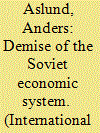

|
|
|
|
|
| Publication |
2011.
|
| Summary/Abstract |
The collapse of the Soviet Union in December 1991 was multiple, but the demise of the very economic system was one important component that in itself rendered its implosion inevitable, and with the Soviet collapse the Cold War came to a definite end. The purpose of this article is twofold, to depict this amazingly fast demise of a petrified economic system and to show how it was connected with the end of the Cold War. Today, the case for socialism is no longer persuasive, but it was not always so. Once, many intelligent people considered socialism not only morally but also economically superior to capitalism and democracy. They thought a benign state would pursue higher ideals than a petty democracy and execute them more effectively. In order to understand the demise of the socialist economic system, we need to comprehend its advantages as well as its drawbacks.
|
|
|
|
|
|
|
|
|
|
|
|
|
|
|
|
| 2 |
ID:
106344
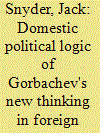

|
|
|
|
|
| Publication |
2011.
|
| Summary/Abstract |
In a chapter, in Myths of Empire (1991), I argued that Gorbachev was seeking to transform atavistic ideas and institutions that had been functional for the initial stage of building socialism, but had become fetters on production and a danger to Soviet security. New concepts of international relations were needed to reduce the dangers and costs of the old confrontational mindset, and also to justify a shift in domestic arrangements away from the military industrial complex, central planning and obsessive secrecy. Together with the international contextual factors that helped to set this process in motion, this domestic political dynamic explains both the peaceful end of the cold war and also the collapse of the Soviet system, which was an unintended byproduct of the democratizing tactics that Gorbachev used to overcome resistance from the old-school military-industrial and ideological elites. These arguments are generally supported by recent accounts of the Soviet collapse and the end of the cold war.
|
|
|
|
|
|
|
|
|
|
|
|
|
|
|
|
| 3 |
ID:
106338
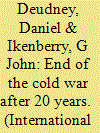

|
|
|
| 4 |
ID:
106345
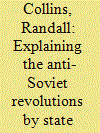

|
|
|
|
|
| Publication |
2011.
|
| Summary/Abstract |
A major area of advance in social science in recent decades has been the state breakdown theory of revolution. This is part of a larger body of theory about the rise of the modern state and the crises that can befall it along the way. It is sometimes referred to as the military/fiscal theory of the modern state, and as a branch of that larger theory, the state-centered theory of revolution. Here I will link military/fiscal theory of the state to geopolitical theory. Military/fiscal theory shows us the central mechanism, both of state growth and state breakdown; these are proximate causes, and further back in the causal chain are geopolitical conditions. Geopolitics tends to be the primer mover in any particular historical sequence, what sets off the changes that eventually lead to state growth or breakdown.
|
|
|
|
|
|
|
|
|
|
|
|
|
|
|
|
| 5 |
ID:
106340
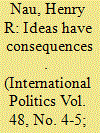

|
|
|
|
|
| Publication |
2011.
|
| Summary/Abstract |
In this essay, I make the case that the Cold War was caused by a competition of ideas rather than by a struggle for power or a failure of international institutions. The Cold War started when two sets of ideas diverged sufficiently - capitalism and communism - that they precluded either a realist - spheres of influence - or liberal - United Nations - solution to postwar differences in Europe. It ended when one set of ideas prevailed, and democracy and markets spread throughout the whole of Europe, eclipsing realist and liberal outcomes. The Soviet Union disappeared, which realists never expected; whereas the United Nations, which functioned briefly as a classic liberal collective security operation in the first Persian Gulf War, was quickly replaced by a democratic NATO in Bosnia and Kosovo. The competition of ideas did not end in the 1990s, however. It continues today in other forms and will shape the contours of military conflict and international cooperation in tomorrow's world, no less that it did during the Cold War.
|
|
|
|
|
|
|
|
|
|
|
|
|
|
|
|
| 6 |
ID:
106346
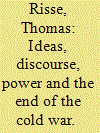

|
|
|
|
|
| Publication |
2011.
|
| Summary/Abstract |
Reagan's rhetoric and actions in the arms race triggered considerable opposition, which was necessary to establish a counter-discourse in particular through the peace movements in the West, which then impacted upon the discussions in Moscow. It enabled Gorbachev to overcome his considerable domestic opposition and to make the necessary concessions, which started to bring the cold war to an end. In this sense, the peace movements won the cold war, too. The end of the cold war was as much a discursive struggle over ideas about international order and the right mix of deterrence and détente as the East-West conflict itself. It is a matter of good fortune that the cold war had a relatively happy ending and that Europe was reunited. Claiming victory for one side or the other seems to be beside the point, even 20 years later.
|
|
|
|
|
|
|
|
|
|
|
|
|
|
|
|
| 7 |
ID:
106341


|
|
|
|
|
| Publication |
2011.
|
| Summary/Abstract |
This article investigates not the causes of the end of the Cold War but the legacy of its ending for international politics in the post-Cold War era. To do so, this essay offers the concept of 'settlement architecture' as a way of understanding the political resolution that follows a historical moment of thoroughgoing transformation, of which the end of the Cold War was a prime example. In particular, it explores both the nature of the settlement architecture advanced successfully by Washington and Bonn in 1990, namely prefabricated multilateralism, and the consequences of that settlement.
|
|
|
|
|
|
|
|
|
|
|
|
|
|
|
|
| 8 |
ID:
106347
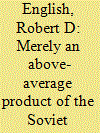

|
|
|
|
|
| Publication |
2011.
|
| Summary/Abstract |
As the Cold War recedes, it becomes increasingly difficult to imagine what might have been and to objectively assess the contribution of Gorbachev's leadership and his legacy. Quite apart from the loss of a historic opportunity to build a radically different post-Cold War international relations, it is that the West did so in large measure out of an inability to understand that this was what, at least by 1989-1990, was central to Gorbachev's diplomacy. By focusing on our victory of superior power, and ignoring the role of Gorbachev's ideas, we ensured that what followed would indeed continue to be dominated by power politics. Once again, realism helps create the world it purports only to describe. By spurning Gorbachev's potentially greatest legacy as a twentieth-century leader, we ensured that this legacy would indeed be considerably less that it might have been.
|
|
|
|
|
|
|
|
|
|
|
|
|
|
|
|
| 9 |
ID:
106339


|
|
|
|
|
| Publication |
2011.
|
| Summary/Abstract |
Responding to the special issue editors request, I conduct a retrospective evaluation of my own scholarship on realism and the end of the Cold War. I reprise the main arguments in light of what appears to be the most probative new evidence. I find that ,even though almost all scholars who write about the Cold War's end either dismiss or denounce explanations informed by realist theory, these explanations actually have stood the test of time and new evidence.
|
|
|
|
|
|
|
|
|
|
|
|
|
|
|
|
| 10 |
ID:
106342
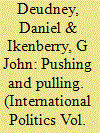

|
|
|
|
|
| Publication |
2011.
|
| Summary/Abstract |
The security environment of the Soviet state during the Gorbachev period was distinctly different from earlier periods. The increased number of non-aggressive states in the Soviet Union's international environment further enhanced the security of the regime in historically unprecedented ways. Nuclear weapons freed the Soviet Union from fears of territorial aggression, while making its own expansion too costly. The achievement of military parity with the West gave the Soviets a further enhanced sense of security. Nuclear weapons also created significant common threats from nuclear war, providing strong incentives for accommodation and cooperation. Looking from the post-Cold War era, both Reagan and Gorbachev finally turned out to be anomalies. The particular circumstances that had created the opportunities for extraordinary breakthroughs by the diplomacy of these two men disappeared almost as quickly as they had arisen.
|
|
|
|
|
|
|
|
|
|
|
|
|
|
|
|
| 11 |
ID:
106348
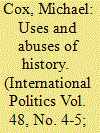

|
|
|
|
|
| Publication |
2011.
|
| Summary/Abstract |
In the by now extended debate about the end of the Cold War and its causes, very little attention has been paid to the role played by historical memory in helping shape the way policy-makers approached the collapse of the post-war order. As this article shows, many, if not most policy elites at the time, confronted the passing of the old world with a great degree of caution and trepidation; and one of the key reasons they did so, it is argued here, is because of their reading of the past. This reading, I go on to suggest, made many of them especially cautious and fearful when faced with great change. In the end of course these changes proved irresistible, and for liberals at least seemed to augur in more peaceful and prosperous times. However, as we shall see here, this unguarded optimism was not much in evidence as the old international system and the other superpower collapsed after 1989. Looking backwards rather than forwards, policy-makers approached the new dawn with much less enthusiasm and optimism than their public pronouncements seemed to indicate at the time or later.
|
|
|
|
|
|
|
|
|
|
|
|
|
|
|
|
|
|
|
|
|